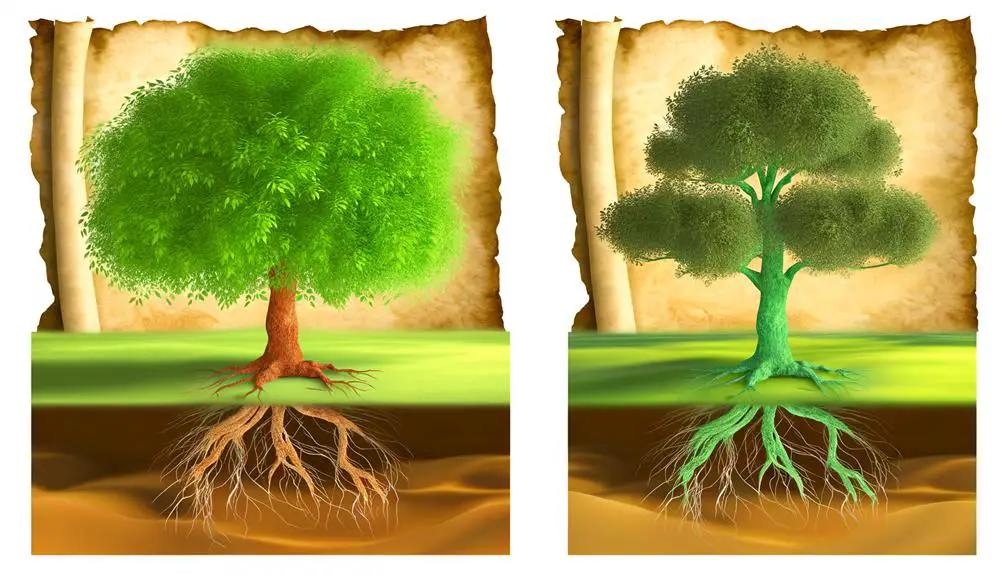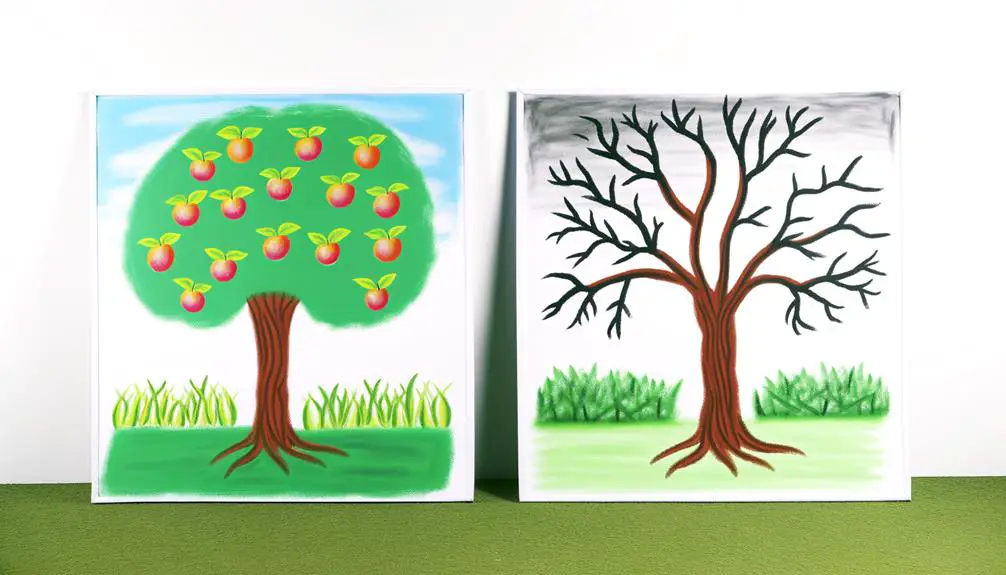This exploration distinguishes jealousy and envy in biblical narratives, revealing their profound impact on relationships and divine directives.
Difference Between Jealousy and Envy in the Bible
In the Bible, you'll find that jealousy and envy are powerful emotions with distinct roots and impacts. Jealousy primarily springs from your fear of losing what you value, guarding personal and divine relationships. It's portrayed through stories like that of Joseph and his brothers, where familial bonds and divine preference ignite fears of loss. Envy, meanwhile, stems from coveting what others have, like in the tragedy of Cain and Abel, leading to destructive outcomes. These emotions not only shape individual behaviors but also divine instructions. Exploring their nuances offers deeper insights into both human nature and moral teachings.
Key Takeaways
- Jealousy in the Bible often stems from fear of losing favor or possessions, as seen in Cain's fear of losing God's favor to Abel.
- Envy in the Bible arises from coveting what others have, exemplified by Joseph's brothers envying his special relationship with their father.
- Biblical jealousy can serve as a protective force, aiming to preserve valued relationships or divine covenant, such as God's jealousy for Israel.
- Envy is portrayed as destructive in the Bible, leading to severe consequences like Cain murdering Abel and Joseph being sold into slavery.
- Both jealousy and envy are pivotal in biblical narratives, influencing character actions and relationships, but jealousy involves attachment, whereas envy focuses on desire.
Definitions and Origins

Both jealousy and envy are emotions deeply rooted in human experience, yet they differ considerably in their origins and implications. Historical analysis reveals that these emotions have distinct etymological paths and cultural interpretations, which can help you understand their unique roles and manifestations across various societies.
Jealousy traditionally springs from a fear of losing something valuable, especially in relationships or social standings, and is often associated with a reactive protection of this perceived possession. On the other hand, envy arises from a desire for something that someone else possesses, accompanied by feelings of inferiority or longing. These definitions, while seemingly straightforward, are imbued with cultural nuances that shape their expression and societal acceptance.
Cultural interpretations further elucidate how these emotions were viewed historically. In many ancient cultures, envy was seen as a destructive force, capable of bringing divine retribution or social ostracization. Jealousy, however, could be perceived both negatively and positively, seen as either a guardian of social bonds or a destructive passion driven by insecurity.
Understanding these origins and interpretations can enhance your grasp of how these emotions function not just personally but within the broader tapestry of human interaction. This nuanced comprehension is essential for interpreting texts like the Bible, where these themes are recurrent and pivotal.
Jealousy in Relationships
As you explore the dynamics of jealousy in relationships, it's essential to understand its roots, often steeped in insecurity and fear of loss. This emotion can profoundly impact partnerships, leading to strained interactions and, in some cases, the dissolution of bonds. Biblical texts offer guidance on mitigating these effects, emphasizing virtues like trust and love to counteract the corrosive nature of jealousy.
Roots of Jealousy
Jealousy in relationships often stems from a perceived threat to one's emotional connection or value in the eyes of a partner. Historical examples, such as biblical figures like King Saul's envy towards David, illuminate how deeply rooted this emotion can be. Psychological analysis suggests that jealousy is not just important but a complex interplay of insecurities, fears, and unmet needs. It's vital to understand that this isn't just about the fear of losing a partner but also about feeling replaceable or inadequate. Such emotions are deeply ingrained and can be traced back to fundamental human desires for security and validation. Recognizing these underlying factors can help you navigate the challenges posed by jealousy in your relationships.
Impact on Partnerships
When jealousy infiltrates a relationship, it often erodes trust and creates a pervasive atmosphere of doubt and insecurity. This isn't just confined to personal relationships; it extends to professional collaborations as well. In the domain of partnership dynamics, jealousy can severely disrupt the mutual respect and cooperation necessary for any successful venture. You'll notice that when one partner harbors jealousy, it can lead to a breakdown in communication and a reduction in the effectiveness of the collaborative efforts. The focus shifts from achieving shared goals to a struggle for validation and recognition. This not only stifles creativity but also hampers progress towards collective objectives, ultimately undermining the very foundation of the partnership.
Biblical Guidance Addressed
In addressing jealousy within relationships, the Bible offers clear guidance that emphasizes the importance of trust and fidelity. Divine counsel, woven throughout the scriptures, admonishes you to foster love and understanding, avoiding the pitfalls of distrust and possessiveness. For instance, Proverbs 10:12 highlights that 'hatred stirs up strife, but love covers all offenses.' This wisdom suggests that nurturing love can preempt feelings of jealousy and conflict.
Further, Scriptural interpretations often point to the story of Joseph and Potiphar's wife in Genesis as a cautionary tale. It illustrates how unchecked jealousy can lead to destructive outcomes, advocating instead for a foundation of trust and truthfulness in your relationships. This narrative underlines that sustaining trust is essential for relational harmony and spiritual well-being.
Envy Among Individuals
Envy, often mistaken as mere jealousy, manifests deeply in individual relationships, subtly undermining trust and cohesion. As you explore interactions within your own life or observe those around you, it's important to recognize how envy can infiltrate and erode the bonds between individuals. At its core, envy arises when you compare yourself unfavorably to others, a phenomenon deeply rooted in social comparison. This comparison isn't just about tangible achievements or possessions but can also encompass talents, relationships, and even perceived happiness.
This leads to competitive behaviors, where the desire isn't only to achieve more but often to see others have less. The destructive nature of envy is evident in how it shifts one's focus from personal growth to rivalry. Consider these aspects:
- Social Comparison: You're constantly measuring your life against others', which can foster feelings of inadequacy.
- Competitive Behaviors: These are actions taken to outperform others, not just to improve oneself.
- Relationship Damage: Envy can cause mistrust and conflict, leading to strained or broken relationships.
Understanding these dynamics is important. By recognizing the signs of envy and addressing them, you can work towards healthier, more supportive interactions that aren't overshadowed by this corrosive emotion.
Biblical Characters and Jealousy

As we examine the biblical narratives, it's evident that jealousy has played a significant role in shaping the actions and relationships of various characters. You'll find that sibling rivalry often serves as a catalyst for this emotion, compelling individuals to behave in ways that are both destructive and insightful concerning human nature.
Consider the story of Cain and Abel, where jealousy over God's favor leads to the ultimate act of violence: fratricide. This narrative isn't just a story about murder; it's a profound exploration of how jealousy can drive one to override familial bonds and moral codes. Similarly, in the saga of Joseph and his brothers, jealousy arises from paternal favoritism and Joseph's dreams of dominance. The brothers' decision to sell Joseph into slavery is a drastic manifestation of jealousy, highlighting how it can lead to betrayal and loss within a family.
Moreover, the concept of divine jealousy is pivotal in understanding God's relationship with His people. Unlike human jealousy, which is often selfish and destructive, divine jealousy is portrayed as a righteous assertion of exclusivity, particularly in the context of idolatry. When you consider God's demand for loyalty in the face of competing deities, this form of jealousy underscores a protective, covenantal love aimed at preserving the sanctity of divine-human relationships.
Biblical Characters and Envy
Exploring biblical narratives reveals that envy, like jealousy, profoundly affects characters' decisions and relationships. Consider Cain's resentment towards his brother Abel. This intense envy led to the tragic outcome of Abel's murder. The story not only highlights personal failure but also marks the severe societal implications of unchecked envy. Similarly, Joseph's brothers, driven by envy of their father Jacob's favoritism towards Joseph, conspired to sell him into slavery. This act of envy set forth a chain of events affecting generations.
Here are three pivotal consequences of envy in these narratives:
- Destruction of Family Bonds: Envy led both Cain and Joseph's brothers to commit actions that fractured their family units irreparably.
- Moral Deterioration: Each character's moral compass skewed under the weight of envy, illustrating how this emotion can lead to ethical decay.
- Long-Term Repercussions: The outcomes of their actions had long-lasting effects, influencing not just their immediate family but entire future generations.
These examples underscore the profound impact of envy in the biblical context. Envy not only disrupts personal and familial relationships but also carries significant moral and societal consequences. This analysis offers a deeper understanding of why such narratives persist in religious texts, serving as cautionary tales.
Moral Lessons on Jealousy

Reflecting on biblical teachings, it's evident that jealousy not only undermines personal integrity but also imparts important moral lessons about human relationships and divine expectations. You can see this through the narratives and commandments that repeatedly underscore the consequences of jealousy and the significance of guarding peace within communities.
Jealousy triggers are abundant in human interactions, often rooted in comparison, perceived threats, or desires for what others possess. Understanding these triggers helps in managing personal emotions and behaviors, aligning them with biblical principles of love and respect for others. The Bible positions jealousy as a disruptor of peace and an antagonist to the contentment and harmony God desires for His people.
Emotional Impact |
Biblical Insight |
|---|---|
Fear and Anxiety |
Jealousy can lead to irrational fears about losing status or relationships, which disrupts inner peace. |
Conflict and Strife |
Biblical stories often show how jealousy leads to conflict within families and communities. |
Spiritual Deterioration |
Jealousy distances individuals from God's intended path of love and unity. |
Loss of Blessings |
It warns that jealousy can cause one to overlook or sabotage their own blessings through discontent. |
In your personal and community life, recognizing and addressing the roots of jealousy is essential. This not only aligns with biblical teachings but also fosters a healthier, more spiritually aligned community.
Moral Lessons on Envy
Envy, often confused with jealousy, poses its own unique moral challenges as highlighted by various biblical narratives. When you investigate the scriptures, it's evident that envy is depicted not just as a personal failing but as a corrosive force that impacts communities and relationships. The Bible underscores that envy originates from a deep sense of inadequacy or lack of fulfillment, which when left unchecked, leads to destructive behaviors and societal comparisons.
Here are some key points to ponder about the moral implications of envy:
- Destruction of Relationships: Envy can corrode trust and foster discord, leading to broken friendships and community strife.
- Personal Unrest: It often results in inner turmoil and unhappiness, as the envious person is consumed by desires for what others possess.
- Spiritual Decay: Envy distracts from spiritual growth, focusing one's energies on earthly and material comparisons rather than divine pursuits.
The consequences of envy extend beyond the individual. They ripple through societies, promoting a culture of constant comparison and dissatisfaction. This societal emphasis on having more or being better than others only deepens the pit of envy. As you examine these narratives, it becomes evident that overcoming envy is essential for personal contentment and societal harmony.
Overcoming Jealousy

To effectively combat jealousy, it's important to first understand its roots and the various ways it manifests in our lives. Jealousy often arises from a deep-seated insecurity or fear of losing something valuable, such as a relationship or personal status. Recognizing these underlying emotions is a significant step toward addressing them.
In pursuit of personal growth, you can develop self-awareness strategies that allow you to acknowledge and analyze these feelings rather than letting them control your actions. Start by reflecting on why you feel jealous and what specific triggers might be involved. This introspection requires honesty and can be challenging, but it's crucial for making meaningful changes.
Further, consider the role of gratitude in reshaping your outlook. By focusing on the blessings and achievements in your life, you shift your attention away from comparative thoughts that fuel jealousy. Developing a habit of gratitude not only enhances your well-being but also fosters a sense of contentment with your own journey.
Lastly, engage in open communication with those around you. Discussing your feelings can demystify them and lead to mutual understanding and support. This openness is pivotal in building trust and reinforcing relationships, thereby reducing feelings of jealousy.
Overcoming Envy
To effectively combat envy, you must first identify its underlying causes within your own heart and mind. Utilizing spiritual tools, such as prayer and meditation, can fortify you against the corrosive effects of envy. Additionally, learning to genuinely celebrate the achievements of others can shift your perspective from one of scarcity to one of abundance.
Recognize Envy's Roots
Often, the roots of envy stem from a deep-seated sense of inadequacy or unfulfilled desires that you might not even be consciously aware of. This foundational issue can provoke various envy triggers, leading to significant psychological impacts. To effectively recognize and address these roots, consider the following:
- Self-Reflection: Regular introspection helps identify hidden feelings of inadequacy or desires that fuel envy.
- Comparison Awareness: Becoming conscious of how often you compare yourself to others can pinpoint triggers that exacerbate feelings of envy.
- Emotional Acknowledgment: Accepting and understanding your emotions can mitigate the intensity of envy and promote healthier mental states.
Spiritual Tools Against Envy
Utilizing spiritual tools can greatly assist you in overcoming envy by nurturing a deeper sense of contentment and spiritual peace. Engaging in deliberate prayer strategies allows you to focus your thoughts on gratitude and humility, which are essential in combating feelings of envy. By praying for strength to appreciate your own blessings and for the well-being of those you envy, you actively shift your perspective from scarcity to abundance.
Furthermore, seeking community support provides a framework for accountability and encouragement. In a community setting, you're reminded that you're not alone in your struggles. This collective experience not only diminishes the isolation that can fuel envy but also promotes a culture of mutual upliftment, essential for personal and spiritual growth.
Celebrate Others' Successes
While celebrating others' successes may seem challenging, it's a powerful antidote to envy, fostering a sense of communal achievement and personal humility. Engaging in empathy training can help you genuinely share in the joy of others. This shift not only enhances your interpersonal relationships but also enriches your spiritual journey. Here's how you can start:
- Recognize Achievements: Acknowledge others' successes openly, which reinforces positive group dynamics.
- Participate in Success Sharing: Actively contribute to and celebrate achievements within your community or network.
- Reflect on Personal Growth: Use others' successes as a mirror for your own potential and areas for improvement.
Frequently Asked Questions
How Do Jealousy and Envy Affect Mental Health?
Jealousy and envy can be detrimental to your mental health, acting as emotional triggers that increase stress and anxiety. Developing effective coping mechanisms is essential to mitigate their negative psychological impacts.
Can Jealousy Ever Be Considered a Positive Emotion?
Can jealousy ever be a force for good? In cases of righteous jealousy, it might boost protective instincts, safeguarding relationships and values. Analyzed contextually, this emotion sometimes serves as a vigilant guardian of bonds.
Are Children More Prone to Jealousy or Envy?
You might find that children are more prone to jealousy, influenced heavily by parental behaviors and social comparisons. Their emotional responses often reflect observed dynamics and developmental stages more than inherent predispositions to envy.
What Are the Physical Symptoms of Jealousy and Envy?
You might notice behavioral indicators like restlessness or withdrawal as physical symptoms of jealousy and envy. Emotional responses can also manifest as increased heart rate and excessive sweating, reflecting these intense feelings.
How Do Other Religions View Jealousy and Envy?
In other religions, like Buddhism and Islam, jealousy and envy are seen as dark shadows over the soul. Buddhist perspectives focus on detachment, while Islamic teachings advocate for purification through gratitude and humility.



Sign up